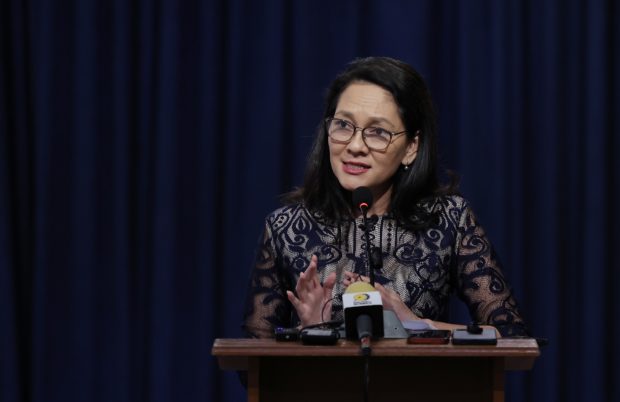
Sen. Risa Hontiveros. Senate PRIB file photo / Joseph Vidal
MANILA, Philippines — A few days after the Anti-Online Sexual Abuse and Exploitation of Children (Anti-OSAEC) bill lapsed into law, Senator Risa Hontiveros said she now hopes to enjoin more social media platforms in the government’s crackdown on online sexual predators.
The Anti-OSAEC law, stemming from the Senate bill authored and sponsored by Hontiveros, augments legal efforts to protect minors against online sexual exploitation regardless of any form of consent from the child.
Producing, willingly accessing, and knowingly sharing any form of child sexual abuse and exploitative materials are punishable under the said law.
Its implementation, according to Hontiveros, will hold accountable social media platforms, electronic service providers, and internet and financial intermediaries.
But aside from their current efforts to engage Facebook in enforcing the said law, Hontiveros also hopes to forge partnerships with other social media platforms where these illegal online practices commonly thrive.
“Magre-reach out pa kami sa mga tulad ng Telegram, Youtube, at iyong mga data storage platforms or devices para humingi din ng pulong para ma-draw in din sila doon sa nasimulang buuing partnerships,” she said during a press conference at the Senate on Wednesday.
(We will reach out and meet with representatives from Telegram, YouTube, and other data storage platforms or devices to possibly partner with them for this.)
The Anti-OSAEC law will give these platforms the responsibility of taking down materials violating minors’ rights, preserving evidence related to the incident, and immediately relaying the proof to law enforcement agencies like the Philippine National Police and the National Bureau of Investigation. Failure to do so will result in a penalty, Hontiveros noted.
“Meron din pong bubuuing National Coordinating Council on OSAEC. Ito po’y isasailalim sa existing na Inter-Agency Council Against Trafficking,” she added.
(We will also form a National Coordinating Council on OSAEC under the already-existing Inter-Agency Council Against Trafficking.)
Although Hontiveros recognizes this law as a game-changing legal tool that will help combat violations of children’s rights, she said it also has its limitations.
“Hindi pa tagos ito sa tinatawag na dark web. Hindi pa nito masasagot iyong limitations, naturally binibigay halimbawa ng end-to-end encryption. Hindi pa nito mapapasukan iyong private messaging,” the opposition senator detailed.
(The law cannot penetrate the dark web yet. It cannot solve the limitations of end-to-end encryption. It also does not allow legal intrusion in private messages.)
Hontiveros later pointed out that the social and economic factors driving minors to commit such crimes must also be addressed.
“Ang pinakamalalim pa rin, pinakadecisive at pinakapangmatagalang pagbabago na dapat natin gawing lahat, bilang isang lipunan, ay tugunan pa rin iyong kahirapan, at iyong iba pang mga pressure both sa mga bata at sa mga adult na nagpro-produce nito, na lumahok sa ganito kadilim na espasyo,” Hontiveros said.
(The deepest, most decisive, and long-lasting change that still needs to be pursued in society is a solution to poverty and other related issues that pressure children and adults to produce and engage in this dark online space.)
RELATED STORIES:
Hontiveros asks NBI, PNP to go after people promoting child abuse online
PNP seeks court aid to track down sexual predators on social media